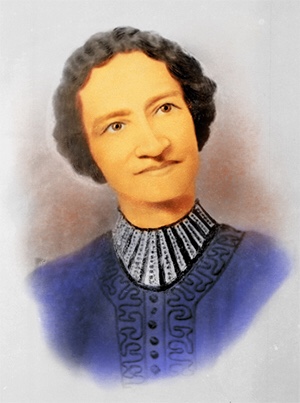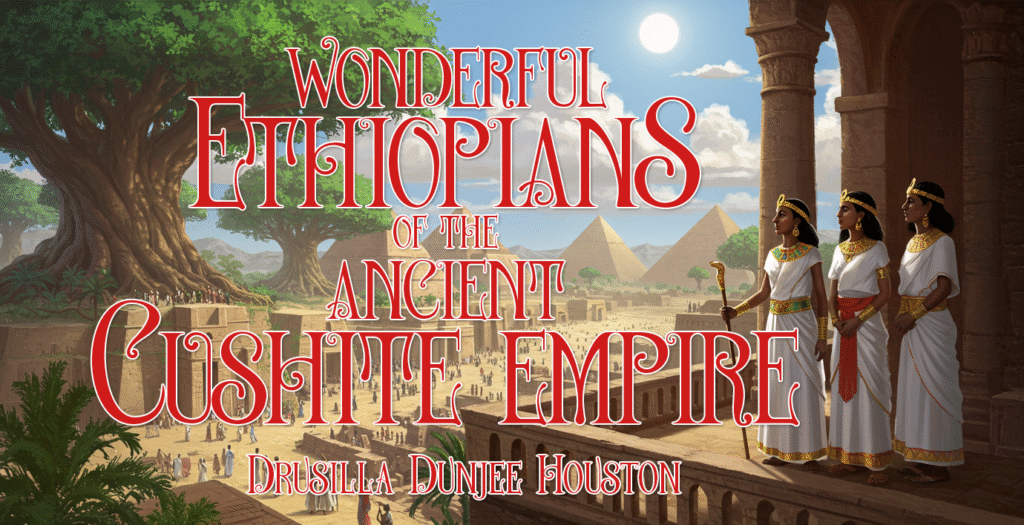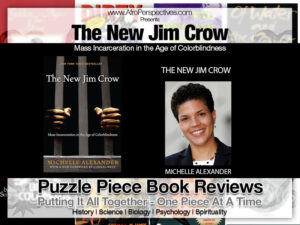
Drusilla Dunjee Houston (1876 – 1941) born in Harper’s Ferry, West Virginia, was a self-taught historian, journalist, and educator. I consider her to be the Mother of modern Afrocentric Historical Detectives everywhere. In 1926, she wrote a pioneering work in the field of Afrocentric studies titled “The Wonderful Ethiopians of the Ancient Cushite Empire.” The book challenges negative Eurocentric narratives which claimed that Negroes had no history or culture by highlighting the advanced civilizations of ancient Ethiopia (Cush/Nubia) and their influence on global culture, including Egypt, Greece, and beyond.
About the Book
Houston was a visionary author and a pioneer in the field that would later come to be called “Afro-Centric” studies. In the U.S. in 1926, history was taught strictly from the perspective of White, male, Western society. At the time, many racially biased White historians argued that Black people had no culture and had made no contributions to civilization, ever. Houston challenged those racist ideas when she contended that the ancient Cushite Empire, located in modern-day Sudan and Ethiopia, was a highly advanced society that predated and influenced Egyptian civilization. With her book, “Wonderful Ethiopians of the Ancient Cushite Empire,” Houston had several goals; to provide evidence for her historical claims, to combat racist pseudoscience, and instill racial pride in Afro-Indigenous Americans.
Within the pages of the book, Houston explored many exceptional Cushite achievements in architecture, astronomy, medicine, and governance, as well as later developments in Africa and the Mediterranean.

Houston also presented evidence that both Egypt and Greece had inherited a cultural legacy from Cush. She contends that early Egyptian pharaohs, religion, and science derived from Cushite traditions. In her book, Houston also challenges the “Hamitic Hypothesis” (a racist colonial theory) by asserting Black African agency in classical civilizations.
Her work also makes connections to ancient contact between the melaninated people throughout the African diaspora as she traces cultural and linguistic parallels between ancient Cushites and other African-descended peoples, including Indigenous Americans.
Legacy of Her Work
Pioneering AfroCentric Scholarship
Drusilla Dunjee Houston’s groundbreaking work laid the foundation for later Afrocentric scholars like Cheikh Anta Diop and John G. Jackson, shaping Black nationalist and Pan-African thought. Long before these thinkers emerged, Houston challenged the racist “Dark Continent” myth by highlighting Ethiopia’s grandeur and Africa’s rich history. Her scholarship provided an early counter-narrative to Eurocentric distortions, paving the way for future generations to reclaim their heritage.
According to author Peggy Brooks-Bertram, writing for the Oaklahoma Historical Society, “Houston’s historical significance lies in her contributions to historical writing and to journalism. The earliest African American woman to write a multivolume study of ancient Africa, she is best known for her classic American historical text, Wonderful Ethiopians of the Ancient Cushite Empire. Written over a twenty-five-year period, the book was published in 1926 and reprinted in 1986. Wonderful Ethiopians was written to correct distortions in the historical record of ancient African people and their descendants worldwide. In a sense, she anticipated the Negritude movement, early Pan-Africanism, and the Black studies and African American studies movements.”
An Interdisciplinary Vision
Houston’s research was ahead of its time, blending archaeology, linguistics, and comparative religion—an innovative approach that few scholars, especially Black women, were pursuing in her era. By weaving together these disciplines, she constructed a more complete and dignified picture of Africa’s past, defying the narrow and often biased academic frameworks of her day.
History as a Tool of Empowerment
In the face of Jim Crow-era racism, Houston’s work served as powerful counter-propaganda, offering Black readers a source of pride and resilience. Her writings inspired early 20th-century Black historians and activists, proving that reclaiming history was essential to resisting oppression. By centering Africa’s contributions to civilization, she empowered her community to challenge systemic racism with knowledge and self-assurance.
Literary Critique
While Drusilla Dunjee Houston’s Wonderful Ethiopians of the Ancient Cushite Empire (1926) is celebrated as a foundational Africentric text, some scholars have critiqued aspects of her methodology and claims.
Balancing Speculative Claims
While Drusilla Dunjee Houston’s work was visionary, some of her arguments, such as the influence of Cushite civilizations on Native American cultures, rely on contested linguistic and cultural parallels rather than solid archaeological evidence. As a self-taught scholar, she occasionally drew from 19th-century Eurocentric sources, even as she sought to dismantle their biases. These limitations remind us of the challenges Black intellectuals faced in accessing rigorous academic resources during their time.
Nuancing Romanticized Narratives
Some critics note that Houston’s portrayal of ancient Cushite society occasionally leans toward idealization, glossing over its internal complexities, such as conflicts or the existence of slavery within African empires. While her goal was to counter demeaning stereotypes of Africa, a more critical examination of these civilizations would have added depth to her scholarship. Still, her work remains vital in reshaping narratives that had long dismissed Africa’s historical significance.
Overcoming Academic Exclusion
Houston’s contributions were largely ignored by mainstream academia during her lifetime – a consequence of both racial and gender bias. It wasn’t until later generations of Black scholars rediscovered her work that she received the recognition she deserved. Her exclusion from institutional spaces highlights the systemic barriers faced by Black women intellectuals, making her achievements all the more remarkable.
Navigating Dated Terminology
Modern readers may notice that Houston’s writing occasionally employs outdated racial classifications like “Caucasoid” and “Negroid,” reflecting the scientific language of the early 20th century. While these terms are now considered problematic, they serve as a reminder of how racial discourse has evolved – and how Houston, despite some constraints of her era, still pushed toward a more empowered vision of Black history.
Drusilla Dunjee Houston’s Enduring Legacy
A Precursor to Afrocentrism
Long before Afrocentrism became a formal academic framework, Drusilla Dunjee Houston’s “Wonderful Ethiopians of the Ancient Cushite Empire” (1926) laid the essential groundwork for future scholars. Her research on Ethiopia and the Cushite civilization influenced later giants of Africana studies, including Yosef Ben-Jochannan (who cited African antiquity as proof of Black excellence) and Molefi Kete Asante (who formalized Afrocentric theory). While some of her claims have been critiqued, her bold insistence on Africa as the cradle of civilization helped shape Black intellectual resistance to Eurocentric narratives.
A Timeless Inspiration for Black Empowerment
Houston’s work remains a vital reference in movements reclaiming Africa’s contributions to world history. From Pan-African activists to K-12 Black history curricula, her writings continue to inspire those challenging systemic racism through historical reclamation. Scholars like John Henrik Clarke and Ivan Van Sertima expanded upon her ideas, proving that her vision of an empowered Black past still resonates today.
A Foundational Critique of Eurocentrism
Decades before postcolonial and decolonial studies entered academia, Houston dismantled the myth of the “Dark Continent” by highlighting Africa’s advanced civilizations. Her work remains a touchstone in discussions on decolonizing history, as seen in modern scholarship by thinkers like Ngũgĩ wa Thiong’o and Walter Rodney. Though later historians have refined some of her claims, her fearless reframing of history set the stage for today’s movements toward intellectual liberation.
Final Thought:
Houston’s legacy is not just in the accuracy of every claim, but in her unapologetic mission to arm Afro-Indigenous people with a history worthy of pride. As Afrocentric studies continue to evolve, her work reminds us that scholarship can be both a weapon and a refuge.
References
- Houston, D. D. (1926). The Wonderful Ethiopians of the Ancient Cushite Empire. Black Classic Press (1985 reprint).
- Asante, M. K. (2000). The Egyptian Philosophers: Ancient African Voices from Imhotep to Akhenaten. Chicago Review Press.
- Moses, W. J. (1998). Afrotopia: The Roots of African American Popular History. Cambridge University Press.




